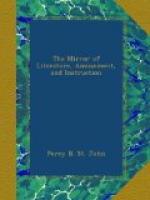The poor woman had told her story without any attempt to make it pathetic, and thus far without apparent emotion or change of voice; but when she came to this part, and spoke of her children, her voice changed and failed—she could only add, looking at Gerald, “You know the rest, master; Heaven bless you!”
The Christmas Box
* * * * *
THE COSMOPOLITE.
* * * * *
ENGLISH GARDENS.
We are veritable sticklers for old customs; and accordingly at this season of the year, have our room decorated with holly and other characteristic evergreens. For the last hour we have been seated before a fine bundle of these festive trophies; and, strange as it may seem, this circumstance gave rise to the following paper. The holly reminded us of the Czar Peter spoiling the garden-hedge at Sayes Court; this led us to John Evelyn, the father of English gardening: and the laurels drove us into shrubbery nooks, and all the retrospections of our early days, and above all to our early love of gardens. Our enthusiasm was then unaffected and uninfluenced by great examples; we had neither heard nor read of Lord Bacon nor Sir William Temple, nor any other illustrious writer on gardening; but this love was the pure offspring of our own mind and heart. Planting and transplanting were our delight; the seed which our tiny hands let fall into the bosom of the earth, we almost watched peeping through little clods, after the kind and quickening showers of spring; and we regarded the germinating of an upturned bean with all the surprise and curiosity of our nature. As we grew in mind and stature, we learned the loftier lessons of philosophy, and threw aside the “Pocket Gardener,” for the sublime chapters of Bacon and Temple; and as the stream of life carried us into its vortex, we learned to contemplate their pages as the living parterres of a garden, and their bright imageries as fascinating flowers. As we journeyed onward through the busy herds of crowded cities, we learned the holier influences of gardens in reflecting that a garden has been the scene of man’s birth—his fall—and proffered redemption.




